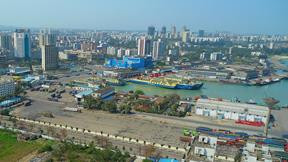China's economy reported faster-than-anticipated growth in Q1 as the easing of strict COVID restrictions allowed businesses and consumers to recover from the pandemic's impact. However, the global slowdown presents potential obstacles to a stable outlook.
The worldwide monetary policy tightening that aims to curb inflation has negatively affected global economic growth, leaving nations like China to rely on domestic demand to boost momentum. This creates a challenge for policymakers seeking post-COVID stability.
Data from the National Bureau of Statistics (NBS) revealed a 4.5% YoY GDP growth in the first three months of the year, surpassing the previous quarter's 2.9% growth and beating analyst predictions for a 4.0% expansion. This marked the strongest growth in a year.
Investors have been scrutinizing Q1 data to evaluate the recovery's strength since Beijing lifted COVID restrictions in December and eased its three-year crackdown on tech and property sectors. Last year, GDP growth suffered due to pandemic restrictions.
Zhiwei Zhang, chief economist at Pinpoint Asset Management, said, "Economic recovery is well on track. The bright spot is consumption, which is strengthening as household confidence improves." He also noted that strong export growth in March likely contributed to Q1 GDP growth.
Although Chinese policymakers have vowed to support the $18 trillion economy and keep unemployment in check, they face limited options as businesses struggle with debt risks, structural issues, and concerns of a global recession.
China's rebound remains uneven, with consumption, services, and infrastructure spending improving, but factory output lagging due to weak global growth. Meanwhile, slowing prices and increasing bank savings raise questions about demand.
China's exports experienced an unexpected surge in March, but analysts warned that the improvement might be due to suppliers catching up with unfulfilled orders after COVID-related disruptions.
NBS spokesman Fu Linghui said that while the economy had a good start, "the international environment is still complex and ever-changing, constraints from insufficient domestic demand are obvious, and the foundation for economic recovery is not solid."
Fu added that China's Q2 growth could see a significant increase due to the low base effect from the previous year.
Analysts predict that China's growth in 2023 will accelerate to 5.4%, up from 3.0% in 2022. The government set a modest GDP growth target of around 5% for this year, after falling short of the 2022 goal.
Although March activity data showed retail sales growth surpassing expectations, the ongoing structural issues in unemployment, property investment, and private sector confidence need to be addressed for a sustained recovery.






